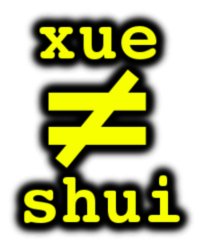'xue'' is not the same sound as ''shui''!'
 I’ve noticed that a lot of people studying Mandarin don’t distinguish between the syllables xue and shui. Usually this is at the beginner stage, but sometimes it seems to have become a habit that sticks right the way through.
I’ve noticed that a lot of people studying Mandarin don’t distinguish between the syllables xue and shui. Usually this is at the beginner stage, but sometimes it seems to have become a habit that sticks right the way through.
In any case, it’s a glaring pronunciation mistake that’s easy to fix. These two syllables are written differently in pinyin because they’re pronounced differently! It seems obvious, but for whatever reason a lot of learners seem to pronounce both as shui.
Pinyin finals üe and ui
It’s not actually limited to those two syllables, but to the pinyin finals (vowel sounds) üe and ui. It’s just that xue and jue are the most common syllables that contains this üe sound. Apart from these, there’s lüe and nüe, which you rarely come across, as well as the semi-common __ que.
The ui sound, on the other hand, is very common. If you take a look at the ui column in the pinyin chart, you’ll see there are thirteen syllables with this final. And a lot of them are super-common, like dui, shui, wei, tui and so on.
An example
I think this mistake occurs most often with the character 学 (xué). The word 大学 is dàxué but some learners seem to pronounce it as dàshuí. Similarly, 学习 (xuéxí), seems to come out as shuíxí. Some people also pronounce 觉得 (juéde) as zhuíde.
Another example is the character 雪 (xuě). If you’re pronouncing 雪 the same as 水, then unfortunately you’re doing it wrong. They’re xuě and shuǐ, respectively.
The üe ⇒ ui mistake
Because the ui sound is so much more common than üe, it’s easy to miss the difference and pronounce them both as ui. Another problem is that when üe is written with an initial x, j or q, you don’t have the dots. So it’s just written xue, jue or que, which look more similar to shui and so on than they really are.
These two sounds are actually very different.
Both of them are diphthongs, which means a vowel sound composed of two ‘shorter’ vowel sounds. Diphthongs also called gliding vowels, as the two sounds glide smoothly one after the other. Have a look at the different sounds that make up ui and üe:
ui: u + ei
üe: ü + e
As you can see, these two finals don’t actually share any of the same vowel sounds! There’s technically nothing similar about them.
u vs ü
First up there’s u vs ü, which is a hurdle for just about every English-speaking learner. The u usually isn’t difficult - it’s pretty much an oo sound. Remember, though, that even this basic sound differs subtly between languages. Copy native speakers as much as possible to pin it down! But the closest thing in English is oo as in boo. That’s a starting point.
The tricky one is ü, which standard English doesn’t have. French and German both have this sound, though. The easiest way to get started with it is to say ee with your lips rounded. That should help you get the knack of it. Again, though, you’ve really got to mimic native speakers as much as possible. Have a listen using this pinyin audio chart.
ei vs e
These sounds should be a little less tricky for English speakers. The closest thing to ei in English is an ay sound like in able. As always, this is only a starting point. It’s essential to listen to native speakers and copy them to actually get it right. The pinyin e sound is similar to the vowel in pet or bet (but you should still mimic native speakers to learn it!).
x vs sh
It’s also worth pointing out here that the x and sh sounds are different as well! This one is pretty nasty and very difficult to get pinned down. Have a good read of the Chinese Pronunciation guide at Sinosplice - it’s probably the best explanation available for learners. And, as ever, keep listening and copying. The more you mimic natives, the better.
I won’t go into a lot of detail about the difference here as I think you’re better off doing a lot of actual practice. The key point is that x is formed with the tongue behind the teeth, whilst sh is formed with the tongue much further back in the mouth. The x sound is much sharper than the sh sound.
Putting it together
Once you’ve listened to those sounds and copied them enough, it’s fairly easy to put them together. Remember:
shui: sh + u + ei
xue: x + ü + e
So xue is very distinct from shui. All of the component sounds are different, in fact. If you’re pronouncing them the same, fix it! It’s not a difficult mistake to fix, and it’s worth fixing.
